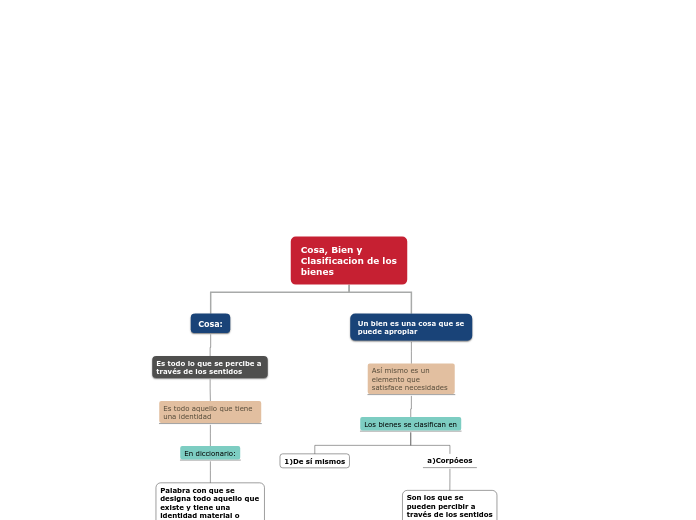av José Arturo Lechuga Morones för 4 årar sedan
306
Cosa, Bien y Clasificacion de los bienes

av José Arturo Lechuga Morones för 4 årar sedan
306

Mer av detta
Type in the name of the multiple-perspectives text.
Example: Bridge to Terabithia by Katherine Paterson
Decide on the second point of view
Name the character (it can either be the main character or one of the supporting characters) whose point of view you are presenting.
Example: Miss Edmunds, Jesse's music teacher.
Type in a quote that points out the character's position about the issue.
Try to follow a citation format: author's name, chapter, and page.
Example: 'She said he was unusually talented, and she hoped he wouldn't let anything discourage him.' (Paterson, 2. 8)
a)Corpóeos
Son los que se pueden percibir a través de los sentidos y ocupan un espacio
ejemplo
vestido, reloj, perfume
b)Incorpóreos
No ocupan ni un lugar en el espacio ni por los sentidos, si no que se perciben a través de la inteligencia como derechos
son los que no son de nosotros, si no de una tercera perona
Dependiendo de la naturaleza serán muebles e inmuebles
Los bienes muebles son aquellos que son tangibles y se pueden mover
Los bienes inmuebles son todos aquellos que no pueden moverse, pero ocupan un lugar
c) Fungibles: pueden ser sustituidos por otros de la misma especie, cantidad y que se pueden contar y medir como el dinero
No fungibles: tiene una individualidad por lo cual no se puede sustituir por otro igual, en este caso se devuelve el mismo bien
se utiliza el contrato de comodato
d) Bienes según considerados por las personas a las que pertenecen: Estos específicamente son dominios del poder publico a los que pertenecen a la federación y a la nación
se utiliza contarto muto
un aceite, una manzana
1)De sí mismos
How is the viewpoint introduced in the story?
Choose an answer:
Identify an important issue from the text that is being presented from different angles. Type it in.
Example: Jesse's drawing talent.
Decide on the first point of view you are going to present.
Type in the name of the character (it can either be the main character or one of the supporting characters) whose point of view belongs to.
Example: Jesse Oliver Aarons, Jr., the main character of the novel, a fifth-grader living in a rural Southern area.
En diccionario:
Type in a relevant quote that highlights the character's point of view towards
Es todo lo que se percibe a través de los sentidos.
Try following a citation format: author's name, chapter, and page.
Example: 'Jesse drew the way some people drank whiskey. (...) Lord, he loved to draw. (...) When he was in first grade, he told his father that he wanted to be an artist when he grew up.' (Paterson, 2. 7)
Palabra con que se designa todo aquello que existe y tiene una identidad material o inmaterial
What type of narration introduces the viewpoint?
Choose an answer: